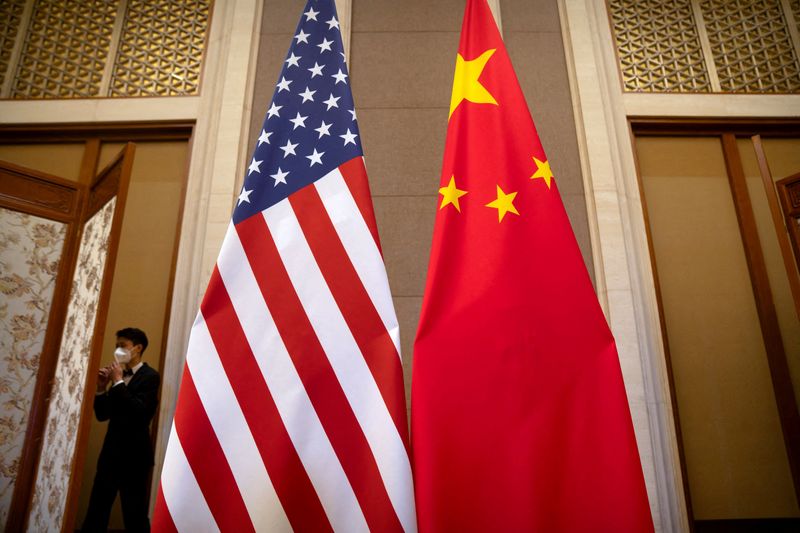US willing to take ‘targeted’ actions against China for national security, Treasury official says
2023.07.26 10:13

© Reuters. FILE PHOTO: A staff member wearing a face mask walks past United States and Chinese flags set up before a meeting between Treasury Secretary Janet Yellen and Chinese Vice Premier He Lifeng at the Diaoyutai State Guesthouse in Beijing, China, Saturday, Jul
WASHINGTON (Reuters) – U.S. Treasury Undersecretary Jay Shambaugh said on Wednesday the Biden administration will not hesitate to take targeted actions against China to secure the national security interests of the U.S. and its allies and to protect human rights, but added that the two countries must cooperate on global challenges.
In prepared testimony before the U.S. Senate Foreign Relations Committee, Shambaugh said economic decoupling would be “disastrous” for both the U.S. and China and nearly impossible to achieve.
“When necessary, we will use a suite of tools to achieve our national security goals. It is our core mission to protect the American people from national security risks while also clearly communicating our position and intent to China to reduce the risk of misunderstanding,” said Shambaugh, who heads Treasury’s international affairs.
The Biden administration is weighing new restrictions on outbound private investment into China and other countries of concern. The Senate voted overwhelmingly on Tuesday to back legislation that would require U.S. companies to notify federal agencies of proposed investments in Chinese technologies such as semiconductors and artificial intelligence.
“To be clear: neither targeted national security actions nor attempts to build diversified supply chains represent decoupling,” Shambaugh said in the prepared remarks. “We seek a fair and healthy economic relationship that benefits both countries and supports American workers and businesses.”
U.S. Treasury Secretary Janet Yellen visited Beijing earlier this month to reopen communications and make the same points to China’s economic leaders, saying the trip put the relationship on “surer footing,” though the world’s two largest economies remained at odds over many issues.
Shambaugh said these differences included U.S. objections to Chinese “non-market” economic practices and excessive government support that put U.S. companies at a disadvantage. He added that the U.S. has also objected to China’s “economic coercion” to punish countries for diplomatic actions by cutting off imports or exports.
He said the Treasury also has been troubled by China’s recent punitive actions against U.S. firms and export controls on critical minerals for semiconductors.
“While we are still assessing their impact, these actions reinforce the importance of our administration’s efforts to build resilient and diversified supply chains,” Shambaugh added.
AREAS OF COOPERATION
Shambaugh, who took over as the Treasury’s top economic diplomat in January, said the U.S. and China must also be able to cooperate on pressing global challenges, such as climate change and growing debt distress in developing countries. The Treasury’s engagement with China has yielded some dividends, including progress on debt restructurings for Zambia, Ghana and Sri Lanka, but more needs to be done, he added.
He also said protecting U.S. economic interests requires “strong and reliable international leadership.”
This requires stronger engagement with allies and partners, particularly low- and middle-income countries, he said, adding that this also requires making sure that the International Monetary Fund and World Bank are “adequately” funded.
Ensuring that there is a sufficient amount of “high-standards” lending available to low-income countries through these and other international financial institutions will help keep them from becoming dependent on loans from China, he added.








